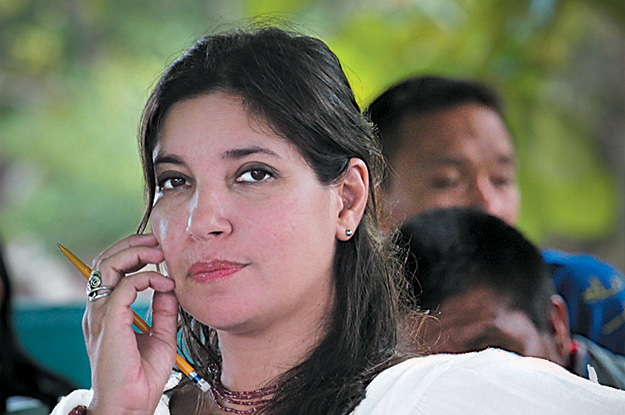María Teresa Quispe is keenly aware of her status as an outsider in the Amazon. Born in London to Peruvian parents, Quispe grew up in Lima, Caracas and Buenos Aires, and initially focused her career on addressing poverty among urban populations. But a chance trip to the Venezuelan Amazon as part of an Inter-American Development Bank project 15 years ago planted the rain forest firmly in her psyche. And her passion for fighting economic inequality kept it there. “In the Amazon, the reality of poverty cannot be defined or conceptualized the way it is in other parts of the country,” she says.
Quispe found that for the indigenous communities who live, hunt, fish and farm in the Venezuelan Amazon, land is currency. “I had to rethink poverty as being not simply a lack of money or food, but as the opposite of well-being,” she says, noting that encroaching threats to indigenous lands, often in the form of illegal mining or logging, put these communities’ cultures, languages and traditional ways of life at risk. After five years working to understand indigenous struggles, Quispe founded the nonprofit Wataniba in 2005. Today, it is one of the few organizations promoting economic and cultural justice for indigenous groups in the most remote areas of the Venezuelan jungle.
Approximately 80 percent of Venezuela’s southern Amazonas state is predominantly populated by indigenous Venezuelans, and the state is home to 30 different language families. Those groups not only have to protect their livelihoods — they have to protect cultures, languages and a natural environment that are under threat.
“Our work definitely has to do with protecting these territories,” says Quispe, “but it also requires understanding that these territories are not empty — they have people, and these are people with special rights and characteristics.”
This “socioenvironmental” approach is what Quispe believes sets her organization apart from groups that fight deforestation but don’t get local populations involved. “You cannot create this as an outsider,” she says. “It has to come from the will and need of the people.”
To this end, Wataniba, which means “our canoe” in the language of the indigenous Kurripaco people, emphasizes intercultural, multilingual training to help indigenous communities take control of the resources available to them on their own terms. This approach is vital to Wataniba’s efforts to work as a liaison between the Venezuelan government and indigenous groups demanding greater territorial sovereignty.
Quispe, 43, recently moved her family back to Peru after 30 years in Venezuela. But the mother of three teenagers still manages to spend roughly 60 percent of her time in the Venezuelan Amazon. And through Wataniba she has big plans for the future.
The group is developing a series of thematic maps, which use satellite monitoring information to track changing land use, define indigenous lands, and draw attention to deforestation. The maps attempt to depict the complicated social and environmental realities of an area covering over 777,000 square kilometers — less than a fifth of which is reachable by car.
And while distance and geography have added another challenge to Quispe’s work, her dedication to standing up for the rights and cultures of indigenous Venezuelans is unshakeable. “The problem of poverty has been an obsession of mine since I was young—not just that of Venezuela, but for all of Latin America,” she says.
—
Brendan O’Boyle is an editor at AQ.






